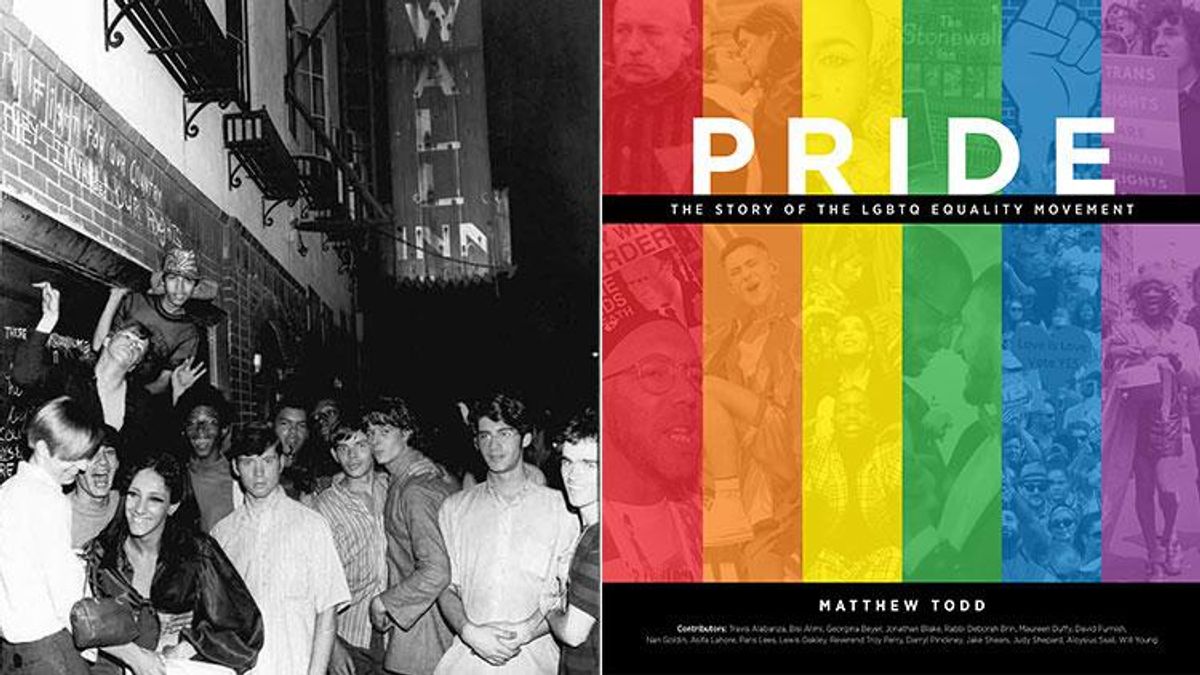Voices
How Stonewall Can Teach LGBTQ+ People to Fight Today

Matthew Todd, author of Pride: The Story of the LGBTQ Equality Movement, shares lessons from the uprising.
Matthew Todd
June 26 2020 8:00 AM EST
May 31 2023 5:55 PM EST
By continuing to use our site, you agree to our Private Policy and Terms of Use.

Matthew Todd, author of Pride: The Story of the LGBTQ Equality Movement, shares lessons from the uprising.
In 1967 as the British establishment considered partially decriminalizing sex between men, the newly first out woman in British public life went on national television to argue for change. Because so few gay people could risk taking part, the debate had been about 'they' and 'them' and very rarely about 'we' and 'us.' But writer Maureen Duffy had the immense bravery and decency to argue on the BBC's Late-Night Line-Up program that we deserved respect before the law. Today it still takes courage to come out, but not many of us can imagine the bravery it took to do so, so publicly, over 50 years ago.
Maureen is a true hero of our movement. And so in 2014, when I was the editor of the U.K.'s Attitude magazine, we gave her a Lifetime Achievement Award at our annual awards event. The audience rose, in tears, when we explained her story, but most hadn't heard of her before. I found that depressing but not surprising. History is told by the winners, they say, and though we have won many battles, it's still controversial to teach that we exist, let alone to teach our history.
There is so much about our collective story we don't know and so many lessons we urgently need to learn. In recent years, we've thankfully begun talking about Marsha P. Johnson and Sylvia Rivera and the erasure of trans people and people of color. But it seems less is commonly known about the context in which the Stonewall riots happened. We know that the community was upset at the death of Judy Garland. Less well understood is that the riots were fermented in a decade of violence, where, in the shadow of the Vietnam War, the threat of nuclear obliteration, and huge social injustice, people were realizing that change was not happening fast enough. President Kennedy had been slain in '63, Malcolm X in '65, and both Martin Luther King Jr. and Bobby Kennedy were murdered within 18 months of Stonewall. Unrest was exploding across the world. From the enormous protests against the Vietnam War, the civil rights movement, the feminist protests against Miss America, the French student riots, and less reported LGBTQ+ fightbacks at Compton's Cafeteria and Coopers Donuts and other places, the world was shifting dramatically.
Understanding our history is not just a cultural indulgence or nicety, it is of huge relevance to today. When Maureen Duffy received her Attitude award in 2014, she warned us that we shouldn't be complacent and that things could be turned back.
"We mustn't take our eye off the ball," she said. 'We can never accept that all is well. We've come a long way, thank goodness... but don't hang up your boots."
On Facebook the next day, some friends disagreed, saying that the bad old days could never return.
What a difference six years makes.
That was in 2014 when Obama was president, Brexit had not happened, and it looked as if the Western world was beginning to embrace trans rights.
Today, just six years later, a pandemic, the threat of which we were warned about but ignored, has paralyzed the world and caused immense suffering and economic devastation. Britain has left the European Union. Right-wing leaders sit in the White House and Downing Street, both fanning the flames of populism and division. Racism and transphobia are being used to win votes; and, not only is the world still not doing anything meaningful about the threat to the environment, but most of us don't seem educated about it or, it is sometimes seen, even interested. We've been told time and time again by the world's leading scientists that the stability of life on Earth is at risk because of rising carbon emissions and the degradation of natural resources. Former NASA Professor James Hansen has warned that the public doesn't understand the devastation will be similar to a direct hit from an asteroid. Sir David Attenborough has warned it will collapse our civilization.
What will that mean for us? We know that as the world is severely stressed - as we see explicitly with Trump's attack on the healthcare rights of trans people - leaders and populations look for scapegoats. I am truly terrified about the lack of action on climate change and what it means for us as LGBTQ+ people, and for everyone.
This year, we celebrate Pride -- not in the streets but, if we are lucky, in smaller communities, or online. This is a good opportunity to maybe party a little less and understand the urgent lessons from our history and wake up to the multitude of threats approaching. If we really want to honor the people who fought at the Stonewall Inn on that unusually hot June night in 1969, then we need to defend the hard-won rights from anything or anyone that threatens the free and stable societies that enable them. Those who wish to control others or have an interest in the status quo will tell you that protest never achieves anything. Stonewall and its legacy prove not only that protest works, but sometimes it is of life and death importance. Voices from 51 years ago are calling us, warning us, urging us to listen and to act.
Matthew Todd is the former editor of Attitude and the author ofPride: The Story of the LGBTQ Equality Movement.